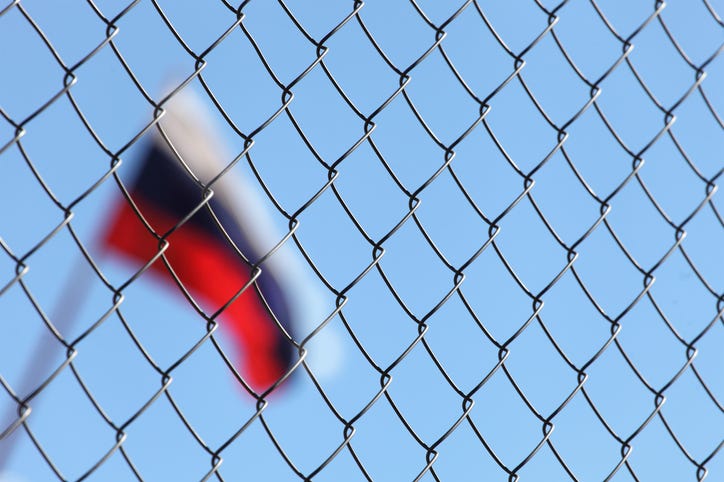Sanctions claim casualties too.
Sanctions are helping the innocent people of Ukraine. But what does their brutal logic mean for innocent people in Russia?
As Putin’s war on Ukraine barrels through its fourth straight week, the stakes are mounting for the Russian despot. Last week, U.K. intelligence analysis suggested that Russia’s invasion efforts have stalled. That news may have seemed, at first, a heartening sign. But with his back to the wall, Vladimir Putin is scaling up his use of more lethal weapons. Earlier this week, Russia announced the first known use of a hypersonic missile — capable of traveling over five times the speed of sound and evading all known weapons deterrence systems.
Meanwhile, Russia’s economy is crumbling as a result of the deepest, most comprehensive sanctions ever imposed on a major economy. Every sector of the Russian economy has been hit — credit cards, electronics, fast food, and oil and gas, the most important sector by far. The ruble has been rendered impotent. The Moscow Stock Exchange remains closed.
Before I go on, I want to be clear that I believe that the sanctions are justified. Not because I believe that sanctions are just — but because deterrent action against Russia’s aggression is warranted, and sanctions are better than all-out war.
But though sanctions are often thought of as bloodless, they are deadly nonetheless. As we focus acutely on efforts to stop the bloodshed, it’s worth engaging with the history, logic, and consequences — often catastrophic — of sanctions as a tool of warfare.
In his masterful history of sanctions, “The Economic Weapon,” historian Nicholas Mulder traces the rise and checkered history of sanctions. Originating after the allied blockade in World War I, Mulder traces how sanctions levied by the ill-fated League of Nations in the interwar period helped to fuel the rise of fascism in Italy and Germany. Far from a deterrent of outright interstate war, they’ve often been used by larger powers to meddle in the internal affairs of smaller countries.
The logic of sanctions is brutal, and too often, it’s also circular. In order to deter the actions of a leader, sanctions choke off economic resources to the populace so that they, in turn, hold their leaders accountable.
To place the brutality of these actions into context, consider the logic of sanctions in direct comparison to the logic of war. The rules of war explicitly preclude belligerents from targeting civilians. While these rules of engagement are often broken, they earn the ire and anger of the world when they are. But sanctions — which we claim to value because they’re bloodless — explicitly target civilians to achieve an indirect military outcome.
Keep reading with a 7-day free trial
Subscribe to The Incision to keep reading this post and get 7 days of free access to the full post archives.




